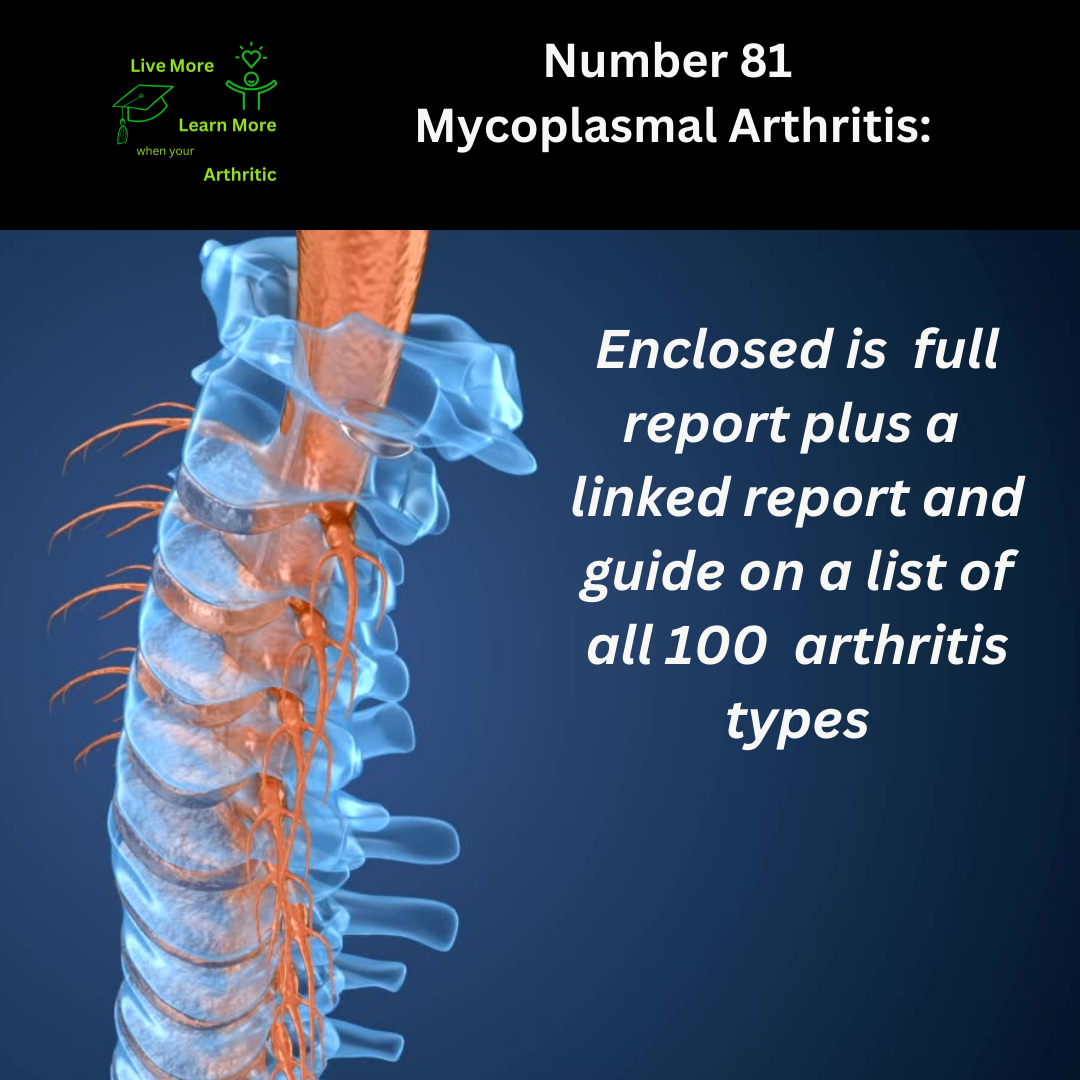
Mycoplasmal Arthritis: Number 81 on the list of 100 types of Arthritis
Unveiling Mycoplasmal Arthritis: Navigating the Intricacies of Joint Health
Mycoplasmal arthritis is a unique form of infectious arthritis caused by mycoplasma bacteria, particularly Mycoplasma pneumoniae. This condition occurs when the bacteria infect the joints, leading to inflammation, pain, and potential joint damage. While less common than other forms of arthritis, mycoplasmal arthritis presents distinct challenges and considerations.
Mycoplasmal arthritis is characterized by joint inflammation resulting from a mycoplasma infection. Mycoplasma bacteria are tiny organisms that lack a cell wall, making them resistant to many antibiotics. When these bacteria infiltrate the joints, they trigger an immune response that manifests as arthritis symptoms, including joint pain, swelling, and stiffness.
Causes and Triggers
The primary cause of mycoplasmal arthritis is infection with mycoplasma bacteria, particularly M. pneumoniae. This bacterium is known to cause respiratory infections such as pneumonia and bronchitis. In some cases, the bacteria can spread to the joints, especially in individuals with weakened immune systems or predisposing factors.
Symptoms and Impact on Range of Motion
Common symptoms of mycoplasmal arthritis include joint pain that worsens with movement, swelling, warmth, and limited range of motion. The affected joints may become tender to the touch, making everyday activities challenging. In severe cases, joint damage can occur if the infection is not promptly treated.
Age of Onset and Prognosis
Mycoplasmal arthritis can affect individuals of any age but is more common in children and young adults. The prognosis is generally favorable with appropriate treatment, and the majority of patients recover completely without long-term joint damage or complications affecting lifespan.
Autoimmune Nature of Mycoplasmal Arthritis
Mycoplasmal arthritis is not considered an autoimmune form of arthritis. Rather, it is an infectious arthritis resulting from a specific bacterial infection.
Improving Quality of Life through Proactive Measures
A proactive approach to managing mycoplasmal arthritis involves prompt diagnosis and treatment of the underlying infection. Antibiotic therapy targeted against mycoplasma bacteria is essential to resolve joint inflammation and prevent further complications. Additionally, supportive care such as rest, joint protection, and physical therapy can help restore mobility and enhance overall well-being.
Possible Complications of Mycoplasmal Arthritis
Complications of mycoplasmal arthritis can include chronic joint inflammation, joint damage if the infection is not adequately controlled, and recurrent episodes of arthritis if the underlying infection persists.
Natural Breakthroughs and Health Advantages
Research into natural approaches for mycoplasmal arthritis management is limited. However, maintaining overall health through a balanced diet, regular exercise, and adequate rest can support immune function and promote recovery from infections, including mycoplasma-related arthritis.
 Demographic Patterns and Gender Distribution
Demographic Patterns and Gender Distribution
Mycoplasmal arthritis can affect individuals of all ages and genders, although children and young adults are more commonly affected. The distribution between genders is relatively equal.
Interconnected Diseases or Conditions
Mycoplasma infections can lead to various complications beyond arthritis, including respiratory tract infections such as pneumonia and systemic manifestations. Close monitoring for recurrent infections and appropriate management are essential for comprehensive care.
In conclusion, mycoplasmal arthritis underscores the importance of timely diagnosis and targeted treatment to alleviate joint symptoms and prevent long-term complications. By adopting a proactive approach and leveraging supportive therapies, individuals affected by mycoplasmal arthritis can achieve improved quality of life and restore joint health with resilience and determination.

